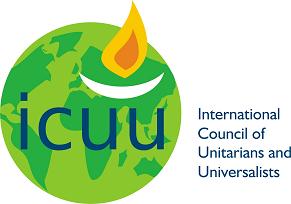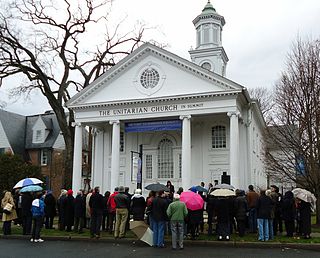Related Research Articles

The Canadian Unitarian Council (CUC) is a liberal religious association of Unitarian, Universalist, and Unitarian Universalist congregations in Canada. It was formed on May 14, 1961, initially to be the national organization for Canadians belonging to the Unitarian Universalist Association (UUA) which formed a day later on May 15, 1961. Between 1961 and 2002, almost all member congregations of the CUC were also members of the UUA and most services to congregations in Canada were provided by the UUA. However, in 2002, the CUC formally became a separate entity from the UUA, although the UUA continues to provide ministerial settlement services and remains the primary source for education and theological resources. Some Canadian congregations have continued to be members of both the CUC and the UUA, while most congregations are only members of the CUC.

The International Council of Unitarians and Universalists (ICUU) was an umbrella organization founded in 1995 comprising many Unitarian, Universalist, and Unitarian Universalist organizations. It was dissolved in 2021 along with the Unitarian Universalist Partner Church Council to make way for a new merged entity. Some groups represented only a few hundred people; while the largest, the Unitarian Universalist Association, had more than 160,000 members as of May 2011—including over 150,000 in the United States.

Unitarian Universalist Association (UUA) is a liberal religious association of Unitarian Universalist congregations. It was formed in 1961 by the consolidation of the American Unitarian Association and the Universalist Church of America, respectively. However, modern Unitarian Universalists see themselves as a separate religion with its own beliefs and affinities. They define themselves as non-creedal, and draw wisdom from various religions and philosophies, including humanism, pantheism, Christianity, Hinduism, Buddhism, Taoism, Judaism, Islam, and Earth-centered spirituality. Thus, the UUA is a syncretistic religious group with liberal leanings.

Unitarian Universalism is a liberal religious movement characterized by a "free and responsible search for truth and meaning". Unitarian Universalists assert no creed, but instead are unified by their shared search for spiritual growth. Unitarian Universalists do not have an official, unified corpus of sacred texts. Unitarian Universalist congregations include many atheists, agnostics, deists, and theists; there are churches, fellowships, congregations, and societies around the world.

A chalice is a drinking cup raised on a stem with a foot or base. The word is now used almost exclusively for the cups used in Christian liturgy as part of a service of the Eucharist, such as a Catholic mass. These are normally made of metal, but neither the shape nor the material is a requirement. Most have no handles, and in recent centuries the cup at the top has usually been a simple flared shape.

A flaming chalice is the most widely used symbol of Unitarianism and Unitarian Universalism (UUism) and the official logo of the Unitarian Universalist Association (UUA) and other Unitarian and UU churches and societies.
Flower Communion, also known as Flower Ceremony, Flower Festival, or Flower Celebration, is a ritual service common in Unitarian Universalism, though the specific practices vary between congregations. It is usually held on the last Sunday of worship in late May or June, as some congregations recess from holding services during the summer. Some congregations hold the ceremony earlier in the spring, sometimes coinciding with Mother's Day or Easter.
The Church of the Larger Fellowship (CLF) provides a ministry to isolated Unitarian Universalists (UUs). Its mission also includes growing Unitarian Universalism by supporting small congregations and new UUs around the world. The CLF also offers resources to Unitarian Universalists active in local congregations.

Unitarian Universalism, as practiced by the Unitarian Universalist Association (UUA), and the Canadian Unitarian Council (CUC), is a non-Creedal and Liberal theological tradition and an LGBTQ affirming denomination.

Religion in Scouting and Guiding is an aspect of the Scout method that has been practiced differently and given different interpretations in different parts of the world over the years.
Camp Unirondack is a social-justice and intentional community-centered youth summer camp and conference center that is located in the western foothills of the Adirondack Mountains near Lowville, New York, on Haudenosaunee Land.
Peter Morales is an American former president of the Unitarian Universalist Association. Morales was the UUA's first Latino president. In the early 2000s, he was the senior minister of the Jefferson Unitarian Church in Jefferson County, Colorado, a rapidly growing Unitarian Universalist congregation in the northwestern Denver-Aurora Metropolitan Area. He also worked for the UUA from 2002 to 2004. In 2008, he announced his candidacy for president, and in 2009 he was elected. As the result of a controversy regarding the UUA's hiring practices and charges of institutional racism, Morales resigned as president in 2017, three months before the end of the term.

Beacon Unitarian Universalist Congregation in Summit is a Unitarian Universalist ("UU") congregation in Summit, New Jersey, United States, formally organized in 1908 as The Unitarian Church in Summit. It is active in social justice initiatives and received the Unitarian Universalist Service Committee Social Justice Award in 2010. It has also been recognized as an outstanding UU congregation by various UU groups. In 2016, Robin Tanner became the Minister of Worship and Outreach.

The Unitarian Universalist Church of Buffalo is an historic church complex located at 695 Elmwood Avenue, in Buffalo, New York. The building was designed by architect Edward Austin Kent in 1906. Kent died in 1912 aboard the RMS Titanic and a memorial plaque is located in the church honoring him.
Unitarian Universalist Church of Kent, Ohio is a Unitarian Universalist ("UU") church in Kent, Ohio. Founded in 1866, the current building was completed by builder Joseph Gridley (1820-1902) in 1868 on land donated by philanthropist Marvin Kent and rests on a bedrock of sandstone. Its 19 founding members were among the major movers and shakers of the then Village of Franklin Mills, and included abolitionists and Civil War veterans. They were: Dr. Aaron M. Sherman, M.D., who served as a Civil War surgeon, a prominent civic promoter, served many terms on the local school board, co-founded the Rockton Masonic Lodge that occupies the historic 1883 summer home of Marvin Kent on West Main Street, served as a State Representative in the Ohio State House of Representatives and whose 1858 home first built by Zenas Kent for his daughter Frances and her husband George Wells was recently saved, moved and restored by local historic preservation activists, Arvin Olin, Ransom Olin, Nelson Olin, Joseph Stratton, who, in 1882, donated the large bell that is in the church belfry, Phillip Boosinger, Mary Boosinger, Rhoda Boosinger, James D. Haymaker and Mary Rosetta Olin Haymaker, J.G. Whitcomb, T.H. Marshall, Eliza Wright, A. Merrell, Almund Russell, Sybil Bradley, Effie Parsons, Mary J. Parsons and Mary A. Furry. These 19 men and women gathered on May 27, 1866, to write and sign the church's constitution in the historic 1836 Village Hall that would serve as an early place of worship before the church building was completed next door in 1868. It is the only church still using its original 19th century building in the city of Kent and in 1976 the site was designed as a "significant restored building site". In the early and middle twentieth century when there were few women clergy anywhere in the United States, the church is notable for having several women ministers: Abbie Danforth in 1889, Carlotta Crosley in 1903, and Violet Kochendoerfer in 1972. Membership is between 140 and 200 full-time adults as well as 100 children in its religious education programs. The church runs a summer camp called Kent Hogwarts which is a Harry Potter-themed camp for young kids, which emphasizes chemistry, poetry, singing and community service. The church advocates social justice, environmental awareness, democracy and acceptance of diverse peoples including all religions. The Kent church follows the seven basic principles of Unitarian Universalism.

Beverly Unitarian Church is a Unitarian Universalist ("UU") church in Chicago, Illinois.

Northwest Unitarian Universalist Congregation (Northwest) was organized in 1969. The organization of Northwest was the result of action taken by the Unitarian Universalist Congregation of Atlanta (UUCA) to establish a new congregation in the northwest suburbs of Atlanta.
References
- ↑ Skinner, Donald E. (7 December 2009). "Chalica, new weeklong UU holiday, slowly gains adherents". Archived from the original on 17 July 2015. Retrieved 5 August 2015.
- ↑ "Celebrating Chalica". uua.org. Unitarian Universalist Association. Archived from the original on 27 July 2015. Retrieved 5 August 2015.
- 1 2 "Chalica – A time of reflection and renewal". UUBGKY.org. Unitarian Universalist Church of Bowling Green. Archived from the original on 2017-01-16. Retrieved 2017-01-13.
- ↑ Van Leer, Lois E. (11 December 2014). "Chalica". wuuc.org. Woodville Unitarian Universalist Church. Archived from the original on 1 October 2015. Retrieved 5 August 2015.
- ↑ Donald E. Skinner (December 7, 2009). "Chalica, new weeklong UU holiday, slowly gains adherents". Archived from the original on July 17, 2015. Retrieved December 6, 2016.
- ↑ Klink-Zeitz, Kathy. "Chalica.info: History". chalica.blogspot.com. Archived from the original on 9 October 2015. Retrieved 5 August 2015.
- ↑ Richards, Michelle (6 December 2010). "Celebrating the winter holidays". Archived from the original on 2010-12-10. Retrieved 5 August 2015.
- ↑ "Some UU Traditions". brisbaneuu.org.au. Brisbane Unitarian Universalist Fellowship Home Page. Archived from the original on 7 August 2015. Retrieved 5 August 2015.
- ↑ Amanda Gregory (December 2, 2013). "Another Winter Holiday!?". The Huffington Post. Archived from the original on December 20, 2016. Retrieved December 6, 2016.
- ↑ Meredith Plummer (November 20, 2013) [2012]. "My Chalica Book: A Beginner's Guide" (PDF) (Second ed.). First Unitarian Church of Cincinnati. Archived (PDF) from the original on June 1, 2016. Retrieved December 6, 2016.